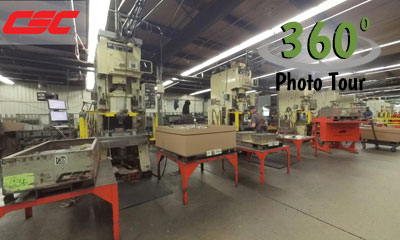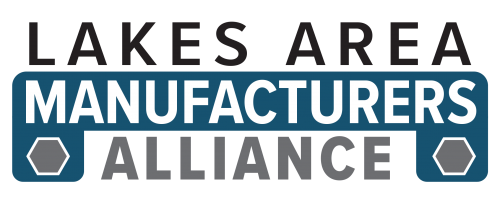Fabricators are the people who create the components that go into small and large-scale products, from toys to tanks. Equipment used to cut out the shapes are Punch Presses, Laser Cutters and Turret Punches. Sometimes the pieces are bent with a Press Brake to create the part that will go into the welded assembly, or mechanically assembled component.
Related Careers: CNC Press Brake Fabricator, Die Setter, Fabrication Operator, Fabricator, Laser Operator, Machine Operator, Machine Tool Operator, Press Operator, Punch Press Operator, Set-Up Operator, Turret Press Operator
Sources: Minnesota CAREERwise & CareerOneStop
Typical Work Tasks
People who work in this career often:
- Review blueprints or specifications to determine work requirements.
- Assemble products or production equipment.
- Fabricate parts or components.
- Install building fixtures.
- Install green structural components, equipment or systems.
- Install plumbing or piping.
- Install roofing materials.
- Mark reference points on construction materials.
- Position structural components.
- Smooth surfaces with abrasive materials or tools.
Typical Working Conditions
People who work in this career often:
- Standing.
- Having face-to-face discussions.
- Wearing common protective or safety equipment such as safety shoes, glasses, gloves, hearing protection, hard hats, or life jackets.
- Exposure to sounds or noise levels that are distracting or uncomfortable.
- Working with a group or team.
- The importance of being accurate or exact.
- Working indoors in non-environmentally controlled conditions.
- Meeting strict deadlines.
- Frequent decision-making.
- Exposure to minor burns, cuts, bites, or stings.
- Responsibility for others’ health and safety.
Tools & Technology used by Sheet Metal Fabricators
Source: Minnesota CAREERwise
Most Important Skills for Sheet Metal Fabricators
- Controlling Quality—Conducting tests and inspections of products, services, or processes to evaluate quality or performance.
- Coordinating with Others—Adjusting actions in relation to others’ actions.
- Mathematics—Using mathematics to solve problems.
- Monitoring Performance—Monitoring/Assessing performance of yourself, other individuals, or organizations to make improvements or take corrective action.
- Teaching—Teaching others how to do something.
- Thinking Critically—Using logic and reasoning to identify the strengths and weaknesses of alternative solutions, conclusions or approaches to problems.
- Making Decisions—Considering the relative costs and benefits of potential actions to choose the most appropriate one.
- Managing People—Motivating, developing, and directing people as they work, identifying the best people for the job.
- Managing Time—Managing one’s own time and the time of others.
- Speaking—Talking to others to convey information effectively.
Most Important Knowledge Areas for Sheet Metal Fabricators
- Mechanical—Knowledge of machines and tools, including their designs, uses, repair, and maintenance.
- Building and Construction—Knowledge of materials, methods, and the tools involved in the construction or repair of houses, buildings, or other structures such as highways and roads.
- Design—Knowledge of design techniques, tools, and principles involved in production of precision technical plans, blueprints, drawings, and models.
- Mathematics—Knowledge of arithmetic, algebra, geometry, calculus, statistics, and their applications.
- Production and Processing—Knowledge of raw materials, production processes, quality control, costs, and other techniques for maximizing the effective manufacture and distribution of goods.
- Administration and Management—Knowledge of business and management principles involved in strategic planning, resource allocation, human resources modeling, leadership technique, production methods, and coordination of people and resources.
- Engineering and Technology—Knowledge of the practical application of engineering science and technology. This includes applying principles, techniques, procedures, and equipment to the design and production of various goods and services.
- Customer and Personal Service—Knowledge of principles and processes for providing customer and personal services. This includes customer needs assessment, meeting quality standards for services, and evaluation of customer satisfaction.
- English Language—Knowledge of the structure and content of the English language including the meaning and spelling of words, rules of composition, and grammar.
- Education and Training—Knowledge of principles and methods for curriculum and training design, teaching and instruction for individuals and groups, and the measurement of training effects.
Interests
Different careers may be a good fit for your personality or interests. This career is:
- Realistic—Realistic occupations frequently involve work activities that include practical, hands-on problems and solutions. They often deal with plants, animals, and real-world materials like wood, tools, and machinery. Many of the occupations require working outside, and do not involve a lot of paperwork or working closely with others.
- Conventional—Conventional occupations frequently involve following set procedures and routines. These occupations can include working with data and details more than with ideas. Usually there is a clear line of authority to follow.
Source: Minnesota CAREERwise
| Wages Per Hour For Sheet Metal Fabricators (MN) | ||
Low$23.26 |
Median$30.14 |
High$46.54 |
Low indicates 25% of workers earn less and 75% earn more. Median indicates 50% of workers earn less and 50% earn more. High indicates 75% of workers earn less and 25% earn more.
Demand
This career is seeing high growth compared to other careers. There will be a need for about 3,123 new Sheet Metal Workers to meet market demand between 2018-2028. This includes the demand due to replacement (workers leaving the occupation or retiring) as well as growth.
Source: Minnesota CAREERwise
This career requires at least a high school degree, and a few professionals attend some college.
View the local post-secondary education options for this career from Central Lakes College.
 Spotlight on Central Lakes College
Spotlight on Central Lakes College
- Why consider CLC?
- Virtual Campus Tours: Brainerd Campus, Staples Campus
- Learn more about the CLC Honors Program.
- Attend CLC, and you may never need to buy a textbook.
If you have a physical, mental, developmental, or cognitive condition that requires educational support, learn about support options at CLC.
Helpful High School Courses
Examples of helpful classes that help you prepare for this career:
- Accounting
- Algebra I and II
- Blueprint Reading
- Business Computer Applications
- CAD Design
- Drafting
- Electronics
- Geometry
- Physics
- Technical Writing
- Trigonometry
- Woodworking
Source: Minnesota CAREERwise

Explore jobs at Clow Stamping through these 360 degree photos.



Visit Minnesota Manufactured for more information about manufacturing careers, as well as links to education and training programs in Minnesota.
Videos
Metal Fabricator (Connect Ed)
Sheet Metal Worker


